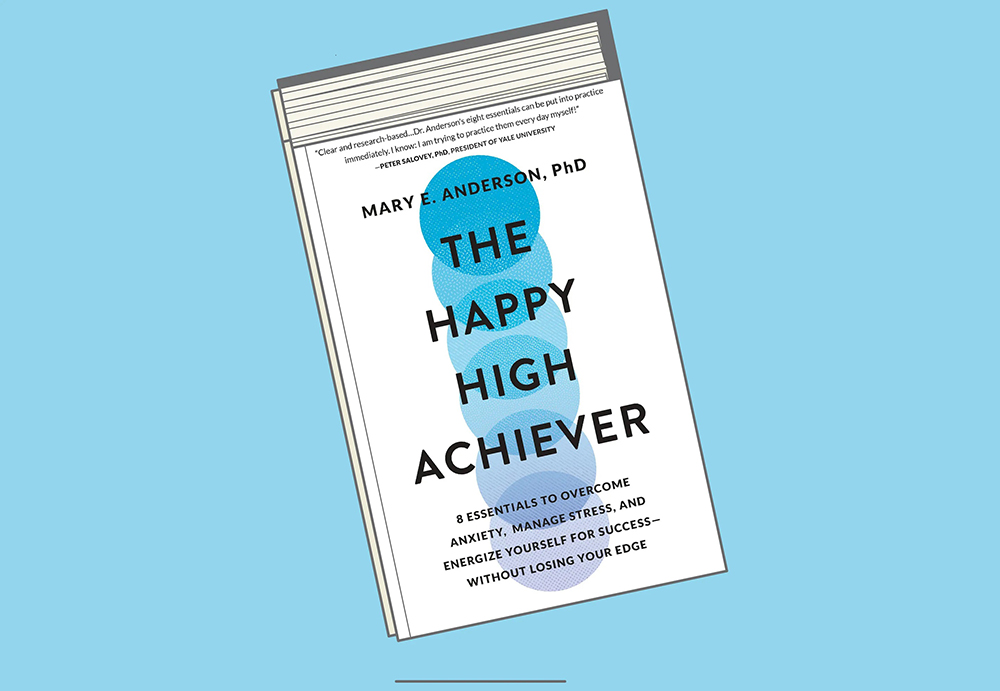
想象一下,你正在做一個有特別設想的項目。但每次動筆,實際效果都不理想。腦海中的完美想象跟當前付諸實施的能力之間存在差距。嘗試的次數越多就越沮喪,直到把最后一張紙揉成一團扔進垃圾桶,怒沖沖一走了之徹底放棄。
是不是引起了些許共鳴?也許童年你就有過典型的追求優秀受挫的記憶。想想有多少次你沮喪地放棄,身后留下一堆紙團?
簡單來說,這就是完美主義:相信你必須做到最好,否則就無法滿意。做不到完美無瑕就沒有意義,根本不值得做。令人不安的是,一旦設定如此難以實現的標準,就容易失去動力,不僅對自己的努力失去了信任,對自己也信心不再。問題不在于成功,實現目標或不斷努力成為最好的自己。問題是將自我價值與成就聯系在一起,所以會害怕犯錯,害怕自己不是最優秀。翻譯過來就是,我們可能會認為,如果不完美就毫無價值。
那么,如何確定自己是因完美主義而焦慮,還是因為目標太高精神崩潰?首先問問自己:壓力和擔憂是否與自我看法有關?認真審視自我暗示。有沒有發現自己會想,“還有這么多事情要做!怎么才能搞定?”或者你會告訴自己,“我應該把這一切都處理好的。我太差勁了。我有什么毛病?”如果你關注重點是工作量,很清楚一個人的內在價值并不取決于工作是否完成,那么很可能只是過度緊張。但是,如果發展到自我批評,對工作感到羞愧或總覺得有不足,那就說明完美主義已達到不健康的程度。
完美主義并不一定會體現在生活的方方方面。一般來說,優秀人士更重視能幫自己提升認可的事,基本都是外在表現,包括外表、成就和人際關系等。例如,我有個非常勤奮的客戶麗茲,她因為不按時看牙醫長期牙疼,每月的美發預約卻從未錯過。
目標遠大或想看起來更好并沒有錯。但現實是,雖然以前追求完美帶來了一些成功,但各有代價。完美主義傾向沒什么用了。你可能感到焦慮、負擔過重、自我評價低,而且最近可能實現目標也越發困難。因為實際上完美主義會適得其反。當然,可能會有一些收獲。但如果永遠死死踩住油門,就無法健康成長,成為更好的自己。
完美主義的問題在于,既無法實現也不可持續,最終變成成功的障礙。“完美主義是一種狹隘的、不夠包容的期望,不允許犯錯誤,也不許有任何不完美,”《CBT完美主義工作簿》作者莎倫·馬丁寫道。“只要犯一個錯誤,就判定自己徹底失敗或低人一等……期望完美時,就不可避免會失望。無論人多么聰明多么努力,都會犯錯。”要處理這么多利害關系,認為必須達到完美才能被視為團隊不可缺的一員,才值得找到新工作,值得晉升,這些都是壓力。面對無法達到的標準,注定會失敗,因為再接近完美也無法實現完美。當現實與期望越不一致,痛苦就越明顯。因此,無法實現的期望會導致長期焦慮和自我懷疑,阻礙進步和提升。
社會福利碩士、意見領袖布蕾妮·布朗博士在《不完美的禮物》(The Gifts of Imperfection)一書中提到,研究表明完美主義實際上會阻礙成功,還可能導致焦慮、抑郁和所謂“生活癱瘓”。后果就是 “因為太害怕把可能不完美的東西帶到世界上而錯過各種機會……所有沒敢追尋的夢想,都是因為深怕失敗、犯錯和讓別人失望”。一定要牢記一點,我們是人,是人就會犯錯。這是事實。所以如果想繼續前進實現目標,就必須重新調整期望承認現實。
這并不意味著必須甘于平庸,或者成日憂心忡忡離群索居。要追求歡樂!有一種方法可以避免陷入痛苦的泥潭,擺脫焦慮的自我傷害循環,拋棄注定失敗的標準。解藥是另一種衡量成功的標準:卓越。標準仍然很高,我們也喜歡這樣!但這次充分考慮到了人性。

卓越等式
卓越的關鍵在于尊重自我,尊重自己的身心和精神,努力追求成功,而不是抱著非完美就算失敗的心態。
每個人都是獨一無二的,一天、一年或一生中以自己的方式展現卓越。為了統一理解,這里的定義就是我提出的“卓越等式”,簡單概述了整體概念:
卓越=健康、快樂和優秀
快樂:情緒穩定,充滿和平、自由和希望,體驗和經歷各種各樣的感受,沒有被否認、評判或永遠沉浸其中的情緒。沒有持續的焦慮、擔憂、恐慌或抑郁。積極優化想法和行為,以減少痛苦促進健康。
健康:充足的睡眠和定期鍛煉,良好的飲食習慣,有效地管理壓力,不使用藥物麻醉,合理就醫照顧好身體。
超越自我:堅持追求有意義的目標,培養和維護牢固的人際關系,加入超越自身的偉大事業,繼續學習和成長(不可停滯不前),感激已擁有的事物。不斷前進,不斷進步,堅持不懈地追求有意義的成就。
畢竟,如果長期感到焦慮和不滿足,漠視身心健康,精力不用來做有意義的事情,生活像孤島,感覺生活中沒有值得感激的事,這樣的生活真的美好嗎?
創造美好的生活,意味著思想(快樂)、身體(健康)和精神(超越自我)是最高要義。(財富中文網)
摘自瑪麗·E·安德森博士的《快樂的優秀人士:發揮優勢且克服焦慮、管理壓力和激勵自我成功的8個要素》。
譯者:夏林
想象一下,你正在做一個有特別設想的項目。但每次動筆,實際效果都不理想。腦海中的完美想象跟當前付諸實施的能力之間存在差距。嘗試的次數越多就越沮喪,直到把最后一張紙揉成一團扔進垃圾桶,怒沖沖一走了之徹底放棄。
是不是引起了些許共鳴?也許童年你就有過典型的追求優秀受挫的記憶。想想有多少次你沮喪地放棄,身后留下一堆紙團?
簡單來說,這就是完美主義:相信你必須做到最好,否則就無法滿意。做不到完美無瑕就沒有意義,根本不值得做。令人不安的是,一旦設定如此難以實現的標準,就容易失去動力,不僅對自己的努力失去了信任,對自己也信心不再。問題不在于成功,實現目標或不斷努力成為最好的自己。問題是將自我價值與成就聯系在一起,所以會害怕犯錯,害怕自己不是最優秀。翻譯過來就是,我們可能會認為,如果不完美就毫無價值。
那么,如何確定自己是因完美主義而焦慮,還是因為目標太高精神崩潰?首先問問自己:壓力和擔憂是否與自我看法有關?認真審視自我暗示。有沒有發現自己會想,“還有這么多事情要做!怎么才能搞定?”或者你會告訴自己,“我應該把這一切都處理好的。我太差勁了。我有什么毛病?”如果你關注重點是工作量,很清楚一個人的內在價值并不取決于工作是否完成,那么很可能只是過度緊張。但是,如果發展到自我批評,對工作感到羞愧或總覺得有不足,那就說明完美主義已達到不健康的程度。
完美主義并不一定會體現在生活的方方方面。一般來說,優秀人士更重視能幫自己提升認可的事,基本都是外在表現,包括外表、成就和人際關系等。例如,我有個非常勤奮的客戶麗茲,她因為不按時看牙醫長期牙疼,每月的美發預約卻從未錯過。
目標遠大或想看起來更好并沒有錯。但現實是,雖然以前追求完美帶來了一些成功,但各有代價。完美主義傾向沒什么用了。你可能感到焦慮、負擔過重、自我評價低,而且最近可能實現目標也越發困難。因為實際上完美主義會適得其反。當然,可能會有一些收獲。但如果永遠死死踩住油門,就無法健康成長,成為更好的自己。
完美主義的問題在于,既無法實現也不可持續,最終變成成功的障礙。“完美主義是一種狹隘的、不夠包容的期望,不允許犯錯誤,也不許有任何不完美,”《CBT完美主義工作簿》作者莎倫·馬丁寫道。“只要犯一個錯誤,就判定自己徹底失敗或低人一等……期望完美時,就不可避免會失望。無論人多么聰明多么努力,都會犯錯。”要處理這么多利害關系,認為必須達到完美才能被視為團隊不可缺的一員,才值得找到新工作,值得晉升,這些都是壓力。面對無法達到的標準,注定會失敗,因為再接近完美也無法實現完美。當現實與期望越不一致,痛苦就越明顯。因此,無法實現的期望會導致長期焦慮和自我懷疑,阻礙進步和提升。
社會福利碩士、意見領袖布蕾妮·布朗博士在《不完美的禮物》(The Gifts of Imperfection)一書中提到,研究表明完美主義實際上會阻礙成功,還可能導致焦慮、抑郁和所謂“生活癱瘓”。后果就是 “因為太害怕把可能不完美的東西帶到世界上而錯過各種機會……所有沒敢追尋的夢想,都是因為深怕失敗、犯錯和讓別人失望”。一定要牢記一點,我們是人,是人就會犯錯。這是事實。所以如果想繼續前進實現目標,就必須重新調整期望承認現實。
這并不意味著必須甘于平庸,或者成日憂心忡忡離群索居。要追求歡樂!有一種方法可以避免陷入痛苦的泥潭,擺脫焦慮的自我傷害循環,拋棄注定失敗的標準。解藥是另一種衡量成功的標準:卓越。標準仍然很高,我們也喜歡這樣!但這次充分考慮到了人性。
卓越等式
卓越的關鍵在于尊重自我,尊重自己的身心和精神,努力追求成功,而不是抱著非完美就算失敗的心態。
每個人都是獨一無二的,一天、一年或一生中以自己的方式展現卓越。為了統一理解,這里的定義就是我提出的“卓越等式”,簡單概述了整體概念:
卓越=健康、快樂和優秀
快樂:情緒穩定,充滿和平、自由和希望,體驗和經歷各種各樣的感受,沒有被否認、評判或永遠沉浸其中的情緒。沒有持續的焦慮、擔憂、恐慌或抑郁。積極優化想法和行為,以減少痛苦促進健康。
健康:充足的睡眠和定期鍛煉,良好的飲食習慣,有效地管理壓力,不使用藥物麻醉,合理就醫照顧好身體。
超越自我:堅持追求有意義的目標,培養和維護牢固的人際關系,加入超越自身的偉大事業,繼續學習和成長(不可停滯不前),感激已擁有的事物。不斷前進,不斷進步,堅持不懈地追求有意義的成就。
畢竟,如果長期感到焦慮和不滿足,漠視身心健康,精力不用來做有意義的事情,生活像孤島,感覺生活中沒有值得感激的事,這樣的生活真的美好嗎?
創造美好的生活,意味著思想(快樂)、身體(健康)和精神(超越自我)是最高要義。(財富中文網)
摘自瑪麗·E·安德森博士的《快樂的優秀人士:發揮優勢且克服焦慮、管理壓力和激勵自我成功的8個要素》。
譯者:夏林
Imagine you’re working on a project for which you have a very particular vision. But every time you put pen to paper, your execution falls short of your ideal. There’s a gap between the perfect image in your mind and your ability to realize the concept in the moment. The more attempts you make, the more frustrated you become, until finally you crumple up one last sheet of paper, toss it in the trash, and storm away, giving up altogether.
Does that scenario resonate, either literally or figuratively? Perhaps you have memories of those kinds of classic anxious high-achieving frustrations even dating back to childhood. How many balled-up pieces of paper have you left in your wake while you walked away feeling defeated, like you failed?
This is perfectionism in a nutshell: the belief that everything you do has to be the very best or it’s not good enough. In fact, unless it’s flawless, it doesn’t even count and isn’t worth doing at all. What’s troubling is that, when we set such unattainable standards, we lose momentum and lose trust not only in our endeavors but also in ourselves. The problem is not the drive to succeed, achieve our goals, or continually become our best self. The problem is that we tie our self-worth to our achievements, so we become terrified to make mistakes or ever look less than the best. Translation: We may believe that if we’re not perfect, we’re worthless.
So how do you know if you’re plagued by anxiety-promoting perfectionism or are simply overwhelmed by too much on your plate? First, ask yourself: Is my stress and worry tied to how I think about myself? Shine your flashlight on your self-talk. Do you find yourself thinking, “I have so much to do! How will I get it all done?” Or are you telling yourself, “I should be able to handle all of this. I must really suck. What’s wrong with me?” If you’re primarily focused on the sheer volume of work, but you know your inherent value as a person is not contingent on whether you get it done, then you’re likely just overextended. But if you are barraging yourself with self-criticism and feeling shame or inadequacy about your work, that’s indicative of unhealthy perfectionism.
Perfectionism doesn’t always manifest in all areas of your life. Frequently, high achievers are consumed with the parts that win them the most potential approval and are external-facing—appearance, achievement, relationships. For example, I had one hardworking client, Liz, who had chronic toothaches because she didn’t prioritize going to the dentist on schedule, but she never missed her monthly hair appointment.
Now, there’s nothing wrong with lofty goals or wanting to look your best. But the reality is that while striving for flawlessness has brought you some success in the past, it has cost you something, too. Those perfectionist tendencies aren’t serving you anymore. You are probably feeling anxious, overburdened, and bad about yourself, and maybe you haven’t been hitting your marks as much as you want lately, either. Because perfectionism is actually counterproductive. You may achieve to a point, sure. But you won’t thrive and be the greatest version of yourself while you’re so afraid to let your foot off the gas.
The problem with perfectionism is that it’s unattainable and unsustainable, rendering it a hindrance to success. “Perfectionism is a narrow, intolerant expectation that we will never make mistakes or have any imperfections,” writes Sharon Martin, MSW, LCSW, author of The CBT Workbook for Perfectionism. “We take one mistake and use it to deem ourselves complete failures or inferior . . . When we expect perfection, we’ll inevitably be disappointed. We all make mistakes, no matter how smart we are or how hard we work.” It’s stressful to have so much at stake, to think that we have to deliver perfection in order to be seen as an indispensable part of a team, a worthy new hire, or deserving of that promotion. Unmeetable standards set us up for failure because even if we come close, flawlessness is not achievable. And the more discrepant our reality is from our expectations, the more distress we’ll feel. So, unachievable expectations can cause such chronic anxiety and self-doubt that they stymie our progress and ascent.
In her book The Gifts of Imperfection, thought leader Brené Brown, PhD, MSW, references how research shows that perfectionism actually hampers success and can lead to anxiety, depression, and what she calls “life-paralysis.” That’s the fallout from “all of the opportunities we miss because we’re too afraid to put anything out in the world that could be imperfect . . . all of the dreams that we don’t follow because of our deep fear of failing, making mistakes, and disappointing others.”2 It’s crucial to remember that, because we are human, we will make mis- takes. That’s a fact. That’s why we have to recalibrate our expectations to acknowledge reality if we want to keep moving forward to achieve our goals.
This doesn’t mean that we must settle either for mediocrity or for an insular life of perpetual worry. Fun times! There’s another way to keep ourselves from getting mired in pursuit of this albatross, to escape the self-sabotaging cycle of anxiety and standards by which we are doomed to fail. The antidote comes in the form of a different metric for success: excellence. The bar is still extraordinarily high—where we like it!—but this time it allows for our humanity.
The excellence equation
Excellence hinges on honoring yourself, mind, body, and spirit, holding space for a range of what success looks like rather than some perfect-or-bust mindset.
Each person is unique and will manifest excellence in their own way, within a day, a year, or a lifetime. So that we have a shared understanding, the working definition we’ll use is what I call the “Excellence Equation,” which outlines the overall concept in simple terms:
Excellence = healthy, happy, and high-achieving
Happy: Stable mood, a sense of peace and freedom, hope, experiencing and moving through a full range of feelings, no emotion being denied, judged, or perpetually stuck in. Definitely not continual anxiety, worry, panic, or depression. Actively optimizing your thoughts and behaviors to reduce distress and promote wellbeing.
Healthy: Getting ample sleep and regular physical activity, eating well, effectively managing stress, not using substances to numb out, taking care of yourself by attending appropriate medical visits.
High-achieving: Sustainably striving for meaningful goals, cultivating and maintaining strong relationships, being a part of something bigger than yourself, and continuing to learn and grow (not settling for stagnation) while also appreciating what you already have. Moving forward, making progress, and persevering in the pursuit of purposeful accomplishments.
After all, would it really be an excellent life if you were walking around feeling chronically anxious and unfulfilled, disregarding your mental and physical wellbeing, not using your energy to accomplish anything meaningful, living in isolation, and thinking you didn’t have anything to be grateful for?
Creating an excellent life means making your mind (happy), body (healthy), and spirit (high-achieving) of paramount importance.
Excerpted from THE HAPPY HIGH ACHIEVER: 8 Essentials to Overcome Anxiety, Manage Stress, and Energize Yourself for Success―Without Losing Your Edge by Mary E. Anderson, PhD. Copyright ? 2024 by the author. Reprinted with permission of Balance, an imprint of Grand Central Publishing.






